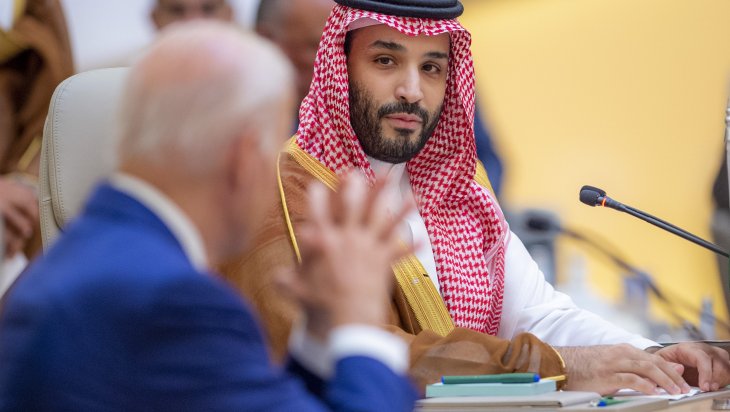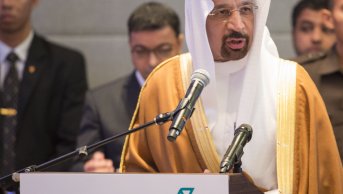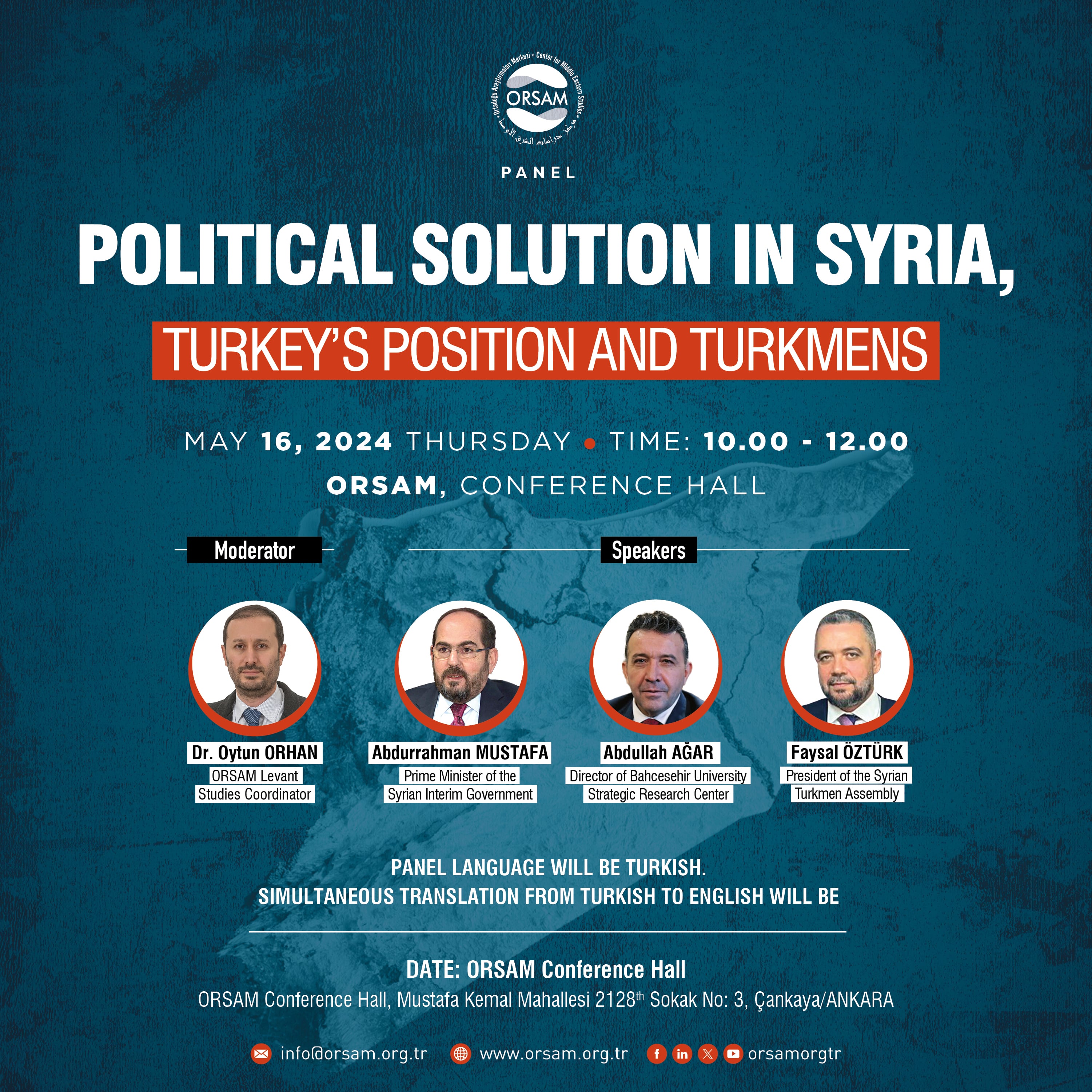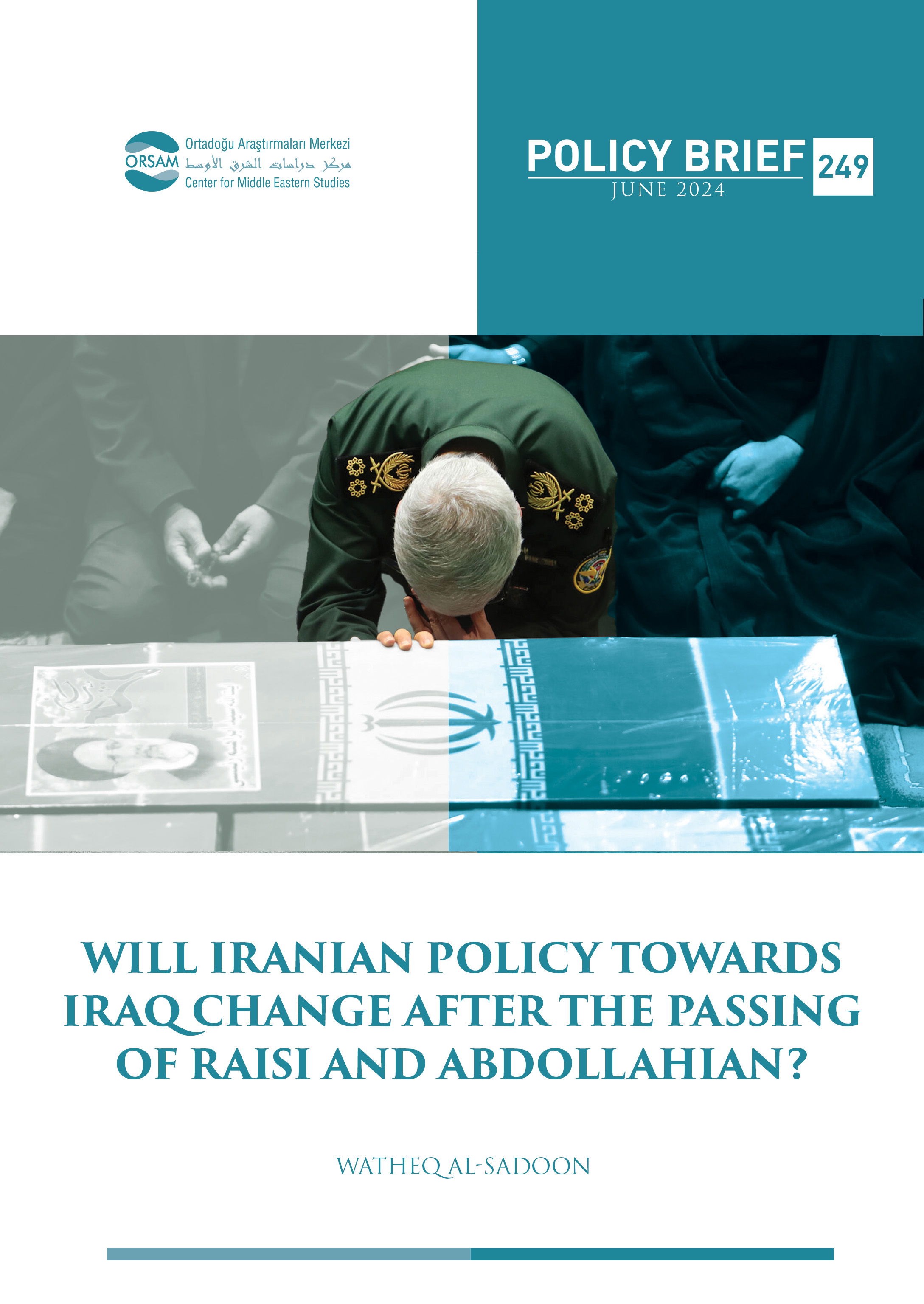From Regional Isolation to Engagement: Exploring the Prospects of Saudi-Israel Normalization

The years-long regional political isolation of Israel, the only non-Muslim and non-Arab power in the Middle East, began to break in 2020 with the political recognition of Israel by the UAE, Bahrain, Sudan, and Morocco. Although the trend of normalization with Israel, which became a regional standard during the Trump era, was interrupted by Israel's military operations against Palestine and other regional and international developments in the first years of the Biden era, it seems to have accelerated again. When looking at the important issues in the recent visits of senior US officials to Saudi Arabia, the US-Saudi Arabia relations, the current situation in the OPEC+ oil production quotas, the situation of oil in global markets, as well as the Russia-Ukraine war came to the fore. However, the inclination that started with US National Security Advisor Jake Sullivan in May then included Secretary of State Antony Blinken and State Department Middle East Specialist Barbara Leaf. On top of all this, Brett McGurk, the White House Middle East Advisor and one of the names that shaped the Middle East policy of the Obama era, visited Saudi Arabia. Amos Hochstein followed the trend and visited Saudi Arabia, following McGurk’s visit.
It seems that one of the important issues in US foreign policy towards the Middle East - more specifically the Gulf region - is to broker a political normalization between Saudi Arabia and Israel. With the transfer of the Bennett-Lapid government back to the Netanyahu government in Israel, the idea of achieving political normalization with Saudi Arabia has come to the fore in Israeli foreign policy. First of all, a political normalization that can take place between Saudi Arabia and Israel is directly related to the individual foreign policy objectives of Saudi Arabia and Israel, their foreign policy strategies up to this period, and the sociology of the countries. At the same time, it can be stated that a possible normalization between the two countries may directly concern the US, China, Iran, and Palestine, or that one of the two actors may show the relationship with these actors as a reason for normalization or not. In addition to the concerns of certain actors, a possible normalization between the two countries also includes several difficulties for Saudi Arabia and Israel. On the other hand, a possible normalization move is highly likely to have consequences for the larger Arab/Muslim world as well as for the Gulf region, as well as for Saudi and Israeli society.
It would be useful to look at the reasons for a possible normalization by Saudi Arabia, or more precisely, why Saudi Arabia would want to normalize its relations with Israel. First of all, when Saudi Arabia puts all political concerns aside, it maintains security relations and intelligence sharing at certain rates with Israel, which has the largest armed force and army against Iran in the region. From this perspective, it is irrational that Saudi Arabia would not want a more institutionalized partnership with Israel, even in the days of normalization with Iran. In this context, focusing on the 2030 economic vision in Saudi Arabia and thus ensuring negotiations with the Houthis through efforts to sign a ceasefire in Yemen after the dialogue process with Iran, ensuring the return of Syrian regime leader Bashar Assad to the Arab League, and the partnership dialogues between France and Lebanon demonstrate that Saudi Arabia does not want any problems in its neighborhood, especially military problems.
In this way, the official dialogues that can be entered into with Israel are the channels that will enable Saudi Arabia to keep an equal distance from both actors in case of possible Israeli-Iranian tensions, and that can put more official pressure on Israel in resolving the Israeli-Palestinian issue, at the very least rhetorically. In addition to all these, the young leader of the country, Mohammed bin Salman, may want to take the lead for a future in which the US becomes stronger in the region by normalizing its relations with the closest actor to the US, to strengthen Saudi Arabia's position in the geopolitics of the Middle East. At this stage, Qatar's close relationship with the US, which still does not recognize the Assad regime, is one of the staunchest defenders of Palestine against Israel, and is the number one US partner in Afghanistan, may push Saudi Arabia to normalization with Israel to get closer to the US. At the same time, considering the political and economic competitive environment within the GCC and the bilateral trade volume of the UAE after normalization with Israel, as well as the cooperation in areas such as technical, cyber security, artificial intelligence, and renewable energy, Saudi Arabia is lagging behind in this respect. It can be stated that the country is left behind and that it wants to normalize with Israel in this way.
At the same time, the normalization process between the two countries has become one of the most important priorities of the US. Although there is a renewed interest in Iran among the Western countries with the Russia-Ukraine crisis, it is clear that the US wants to strengthen Israel against Iran's destabilizing threats in the region. In this way, Israel's political normalization with Saudi Arabia will add a point to the US in the global competition against China, which has ensured Saudi-Iranian normalization in the recent period and will ensure that Iran's security threats are eliminated more strongly. One of the reasons why the US is interested in a possible Saudi-Israeli normalization is the desire of the Biden administration to regain its domestic legitimacy. A diplomatic victory in the Middle East, 6-7 months before the campaign period of the 2024 elections, in which Democrats will compete with Biden, could be an important foreign policy achievement for Biden.
Besides, Iran can be affected by a possible Saudi Arabian-Iranian normalization. Iran has recently re-normalized relations with Saudi Arabia with an agreement brokered by China, and the foreign ministers of the two countries even held talks in the Iranian capital, Tehran, recently. Not only this move, but since the second half of 2019, the Gulf countries, which could not get tangible US support in the region against Iranian threats, have taken a new stance against Iran. For an Iran that achieves normalization with Saudi Arabia and aims to strengthen it, Saudi-Israeli normalization may again mean the deterioration of relations with Saudi Arabia and getting ahead of Saudi Arabia in the discursive race for the leadership of the Islamic world. In a meeting attended by Saudi Foreign Minister Faisal bin Farhan in Tehran, Iranian President Ibrahim Reisi stated that "all anti-Muslim countries, especially the Zionist entity", are against the Saudi-Iranian normalization, almost giving a message to Saudi Arabia's normalization talks with Israel. In this context, it is highly probable that in the possible Saudi-Israeli normalization, when the "discursive" agreements between Saudi Arabia and Iran are shelved, Saudi Arabia will again be exposed to asymmetric threats from Syria, Yemen, and the geographies where Iran's militias are located. However, Iran's assessment of a possible normalization in this way may bring about the evaluation of different equations since an Iran that has resorted to more military means and a show of force may evoke exactly the "radical Iran" that Israel wants.
In addition to all these, a possible normalization poses serious difficulties for Saudi Arabia. Saudi Arabia, above all, refuses to recognize Israel in a future without a Two-State Solution, to the extent that it was announced and previously voiced in the Arab Peace Initiative in 2002. While it may be seen as more rhetorical and symbolic in the face of regional threats, the most notable detail in Saudi Arabia's statements is the precondition of Israeli normalization being presented as the resolution of the Palestinian issue based on the 1967 borders and the Two-State Solution framework. The potential resolution of this issue through a prompt and uncomplicated agreement clause could emerge as a significant concern within Israeli domestic politics. Furthermore, Saudi Arabia's historical involvement in the four Arab-Israeli wars and its strong ties with the Palestinian people create substantial obstacles for the Saudis in pursuing any form of normalization with Israel. It should also be considered a strong possibility that King Salman's principles, explained by his older brother Abdullah, will not be swept away from his post, obviously due to his age.
The feasibility of meeting this expectation from Israel's perspective is highly questionable. At the current stage of the Israel-Palestine conflict, it is possible to argue that there is limited support within the Israeli public for such a solution and the political will to implement it. Furthermore, Israel continues to build settlements in the West Bank, further complicating the Two-State Solution. Additionally, violent clashes have been taking place between the Israeli military and Palestinian groups in both Gaza and the West Bank since 2021. Violations at the Al-Aqsa Mosque compound are increasing, and there are concerns about Tel Aviv's commitment to upholding the sanctity and status quo of holy sites. As a result, in order to gain momentum in the normalization of Tel Aviv-Riyadh relations, efforts may be made in parallel with the processes leading to the Abraham Accords, focusing on public diplomacy and alleviating societal sensitivities. The establishment of official Israel-Saudi Arabia relations is believed to be contingent upon a resolution of the Palestinian issue, but the conditions for this are not met from Israel's perspective, and it is considered highly unlikely in the near to medium term. In other words, the fate of normalization depends on how committed Saudi Arabia remains to the resolution of the Palestinian issue, as it has previously stated. Moreover, the argument that the Abraham Accords would expand the Gulf actors' influence over Israel regarding the Palestinian issue and the rights of Palestinians, leading Tel Aviv to adopt more moderate policies, has already been debunked in light of Israel's increasingly hardline approach.
Drivers and hurdles in the path to normalization: Covert relations and diverging security interests
Israel is an actor that has been able to develop covert security relations with regional actors since its establishment and has successfully maximized the benefits derived from them. In this regard, Tel Aviv, with the security perspective of being "surrounded by hostile Arab countries" and facing geographical disadvantages that make it a difficult country to defend, has established relationships with the peripheral actors in the Middle East and North Africa as a response to perceived chronic threats. The general covert nature of these relations is a key factor in enabling the parties to engage in security dialogue and sustain it, free from societal reactions and pressures from other countries in the region. In doing so, Tel Aviv has leveraged its security and intelligence capabilities to establish these relationships, turning them into valuable assets for consolidating its national security.
Israel's emphasis on confidentiality in its dialogue, particularly with the Gulf countries, plays a significant role in deepening bilateral relationships characterized by shared threat perceptions and security-based cooperation. In this regard, the maturity of these relationships has been influenced by the escalating common threats emanating from Iran, particularly in the aftermath of the Iraq War, as well as the security concerns of Gulf states fueled by the popular movements. These conditional factors have been important in establishing these relationships. Following the US invasion of Iraq in 2003, Tehran began investing significantly in the development and expansion of militia networks in the region, primarily in Iraq, in line with its national security assessments. Based on the developments in the region, it became apparent that Iran has made substantial strides in its capability to conduct asymmetric warfare. For instance, in 2006, during the 34-Day War against Hezbollah in Lebanon, considered a prototype of Iran's regional proxy warfare, Israel could not achieve its strategic objectives, and despite suffering significant losses, Hezbollah managed to maintain its presence in the region. In 2007, which was a challenging year for the US military in terms of casualties in Iraq since the invasion, regional actors became increasingly concerned about Iran's capacity to extend its influence in the Middle East. Accordingly, during this period, Riyadh openly expressed its dissatisfaction with both Iran and Hezbollah's activities. That is why the subsequent meeting between Prince Bandar bin Sultan, the then Saudi Arabian National Security Advisor, and Ehud Olmert, the then Israeli Prime Minister, was significant within the framework of Israel's engagement with regional countries and also in understanding the nature of bilateral relations.
The popular movements driven by political and socio-economic demands, followed by the weakening of state structures in the Middle East, have also been another factor that has deepened the threat perceptions of not only Israel but also Gulf states. This situation has provided Iran with opportunities to strengthen its cooperation with non-state actors and create a favorable environment for expanding its influence in the region. Indeed, during this period, news regarding Israel's security and intelligence cooperation with the Gulf began to surface in open sources. The signing of the Nuclear Agreement in 2015 also provided Iran with an opportunity to expand its regional influence, which further heightened concerns for Tel Aviv and the Gulf countries regarding Tehran's activities. At this point, as expressed by —the then Chief of Military Intelligence (Aman)—the Chief of General Staff Herzl Halevy, pragmatic Sunni countries began to align their interests with Israel. Moreover, the shift of focus in US security policies towards South Asia and the approach of not pursuing a stable policy that provides satisfactory solutions to the threat perceptions of its Gulf partners accelerated the efforts of regional countries to develop alternative policies. While this does not imply a complete US withdrawal from the Middle East, the shifting global power dynamics and the region's diminishing priority for Washington, also referred to as “American disengagement”, have become a common source of concern for Israel and the Gulf. On the other hand, the willingness of the US to act in accordance with its own priorities, such as the renewed speculations about Washington seeking a middle ground with Iran, despite the lack of results from the Vienna talks aimed at reviving the Nuclear Agreement. Israel, on the contrary, consistently articulates its apprehensions and asserts its readiness to employ military force if necessary, citing the persistent advancement of Iran's nuclear program as the primary reason. By the year 2020, the signing of the Abraham Accords between the UAE and Bahrain with Israel served as a critical and historic step facilitated by Washington towards achieving security cooperation and stability among its regional partners, breaking mold of Israel’s isolation since its establishment and largely resolving its legitimacy issues in the eyes of Arab states. In addition, it is necessary to express that the United Arab Emirates has emerged as the primary beneficiary among the countries involved in this agreement, while the other signatory states have not been able to attain commensurate advantages. The absence of a similar step with Saudi Arabia can be viewed as the primary shortcoming of this new regional equation.
The normalization of relations between Israel, the UAE, and Bahrain constitutes a significant departure from the regional status quo and can also be seen as a critical step in Tel Aviv's strategy to encircle Iran. In response to the conflict dynamics introduced by Iran through its proxies around Israel, Israel seeks to establish influence through its acquired intelligence capacity via allies in the Gulf, particularly in the context of the Gulf. In fact, Israel's recent military measures primarily aim to counter the ballistic missile threat directly linked to Iran, serving as a component of its "multi-front war strategy." The technical details of the attempted establishment of the "Middle East Air Defense Alliance" (MEADA) between Israel and its Gulf partners in 2022 also indicate the prevalence of Tel Aviv's security concerns in this regard. The absence of Riyadh from this alliance can be considered a strategic loss not only in terms of the political and socio-economic outcomes of the Abraham Accords but also for the encirclement of Iran.
On the other hand, an important contradiction arises from Israel's attempt to enhance its security relations with Gulf countries and leverage their geostrategic position against Iran, while actively objecting to their requests for advanced military platforms from the United States, utilizing its influence in Washington in this regard. Israel's objection to UAE's procurement of F-35 aircraft is also evaluated within this context. Moreover, it is debatable whether initiatives like MEADA contribute to alleviating Israel's security concerns arising from Iran while at the same time providing an equivalent response to the threats faced by these countries through the geographical proximity they share with the Gulf. Consequently, these countries both normalize relations with Israel, thereby risking their relations with Iran, and struggle to fulfill their aspirations for advanced armament due to Israel's objections within the framework of the security equation affected by the changing U.S. policies of potential withdrawal from the region. The Aramco attack by the Houthis in September 2019 and the Abu Dhabi attack in January 2022 clearly demonstrated the threats faced by both countries. Moreover, Israel's tensions with Iran-backed actors in Lebanon and Syria in the north, as well as its declarations that it will not allow Iran to achieve nuclear capability and will take all necessary measures in this regard, expose Gulf actors to the risk of being drawn into this conflict. In this equation, the normalization of relations between Saudi Arabia and Iran in March 2023 represents a significant breakthrough. Riyadh has positioned itself outside the dynamics of the Israel-Iran conflict and adopted a more neutral stance. While this essentially signifies a loss in one of Israel's pillars of the containment strategy against Iran, it is observed that Tel Aviv's willingness for normalization with the Gulf states continues. However, in the long run, the gains in becoming an accepted legitimate actor in the region achieved through the Abraham Accords will remain incomplete due to Saudi Arabia's exclusion from the process. Furthermore, a potential normalization also holds the potential for significant benefits, such as possible Saudi investments in Israel's start-up ecosystem.
The development in March 2023 that will significantly impact all the aforementioned analyses is the signing of the Riyadh-Tehran normalization agreement, mediated by China. In this context, it is imperative to reassess Saudi Arabia's regional threat perceptions and comprehend the structural implications of this phenomenon, which has conventionally been a determinant of regional balances. Through this agreement, Riyadh appears to be the actor that has most effectively consolidated its own security in the region. Given the current geopolitical landscape where the United States is diminishing its influence, Saudi Arabia, with the support of China, has normalized its relations with Iran, thereby gaining control over threats originating from Tehran. Therefore, it is possible to confirm this situation through the warming of Saudi Arabia-Lebanon relations and the seemingly approaching resolution to the internal conflict in Yemen. As a result, Riyadh may strive to counterbalance the perception of leaning towards a China-focused foreign policy by concurrently normalizing its relations with Israel. In this context, securing Israel's influence in Washington would be a notable achievement for Riyadh. Ultimately, a potential normalization with Tel Aviv would enable Saudi Arabia to assume a more neutral position in the region, particularly with regard to the Iran-China and Israel-United States axes, thereby diversifying its foreign policy and staying outside the realm of potential conflict equations in the region. Hence, in the chronically unstable Middle East, where covert security relationships are more aligned with the interests of the involved actors within the current geopolitical context, the desirability of normalization, particularly within the context of Saudi Arabia, and the feasibility of bearing the societal and regional burdens it would entail, emerge as crucial subjects of debate.
Conclusion
A possible normalization would have a serious impact on the wider Arab world and the Muslim world. Saudi Arabia may lose its weight in institutional structures such as Rabita and the Organization of Islamic Cooperation, and it may pave the way for countries such as Algeria, Iran, Kuwait, and Qatar. Therefore, it is highly probable that the processes of ideologies such as Wahhabism, whose influence is tried to be limited inside, will continue to be supported abroad with the recognition of Israel by Saudi Arabia. Saudi Arabia's normalization with Israel will also change the balance within the GCC. Thus, Saudi Arabia may experience problems in its relations with countries such as Kuwait and Qatar, which make it a political discourse that Israel will not be recognized directly and may lose its influence on countries such as Kuwait. But in another climate, the number of actors with whom Israel can do business in the Gulf will increase, and this issue may in the future strain the economic rivalry between Saudi Arabia and the UAE, which is already in high gear and may affect the economic development of the GCC as a whole.









